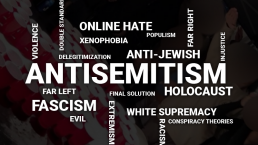Antisemitism in its simplest term can be defined as hatred and bigotry towards Jews, but in today’s modern world, this hatred can take many shapes and forms. In the pages below, we have compiled some information to help you learn about antisemitism and navigate this complex subject so that you are better armed to respond and hopefully educate others as well.
The persecution of Jews has been around for millennia, taking many shapes and forms – whether because of their religion, their success, or simply for being different. It is a prejudice as old as time.
There are many Federal and state provisions that address and protect against harassment, bullying, and discrimination based on a person’s race, color, religion, sex (including gender identity, sexual orientation, and pregnancy), national origin, age, or disability.
A hate-based incident describes a hostile expression that may be motivated by another person’s race, color, disability, religion, national origin, sexual orientation, or gender identity. An antisemitic incident then describes any such expression against a Jewish person or persons.
If a friend or colleague criticizes you for supporting Israel, or a colleague calls you a “colonial Zionist” during a debate about the Palestinian-Israeli conflict, does that constitute antisemitism? Should you challenge them – and if so, how?



